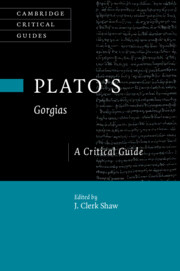Book contents
- Plato’s Gorgias
- Cambridge Critical Guides
- Plato’s Gorgias
- Copyright page
- Contents
- Contributors
- Abbreviations
- Introduction
- Chapter 1 Gorgias of Leontini and Plato’s Gorgias
- Chapter 2 Ancient Readers of the Gorgias
- Chapter 3 Philosophy and the Just Life in the Gorgias
- Chapter 4 Socrates and Coherent Desire (Gorgias 466a–468e)
- Chapter 5 The Ethical Function of the Gorgias’ Concluding Myth
- Chapter 6 Shame in the Gorgias
- Chapter 7 Desire and Argument in Plato’s Gorgias
- Chapter 8 Cooperation and the Search for Truth
- Chapter 9 Freedom, Pleonexia, and Persuasion in Plato’s Gorgias
- Chapter 10 Revealing Commitments
- Bibliography
- Index
- Cambridge Critical Guides
Chapter 9 - Freedom, Pleonexia, and Persuasion in Plato’s Gorgias
Published online by Cambridge University Press: 25 May 2024
- Plato’s Gorgias
- Cambridge Critical Guides
- Plato’s Gorgias
- Copyright page
- Contents
- Contributors
- Abbreviations
- Introduction
- Chapter 1 Gorgias of Leontini and Plato’s Gorgias
- Chapter 2 Ancient Readers of the Gorgias
- Chapter 3 Philosophy and the Just Life in the Gorgias
- Chapter 4 Socrates and Coherent Desire (Gorgias 466a–468e)
- Chapter 5 The Ethical Function of the Gorgias’ Concluding Myth
- Chapter 6 Shame in the Gorgias
- Chapter 7 Desire and Argument in Plato’s Gorgias
- Chapter 8 Cooperation and the Search for Truth
- Chapter 9 Freedom, Pleonexia, and Persuasion in Plato’s Gorgias
- Chapter 10 Revealing Commitments
- Bibliography
- Index
- Cambridge Critical Guides
Summary
This chapter interprets Plato’s Gorgias against the backdrop of the Athenian discourse on freedom, pleonexia, and empire, especially as it appears in Thucydides. If readers are attuned to the symbols and vocabulary of Athenian imperial ideology, then Socrates’ conversation with Gorgias reveals the Sicilian orator to be holding out an unsavory promise to his students – that is, to turn them into architects of tyrannical power, like Themistocles and Pericles. Building on these themes, Socrates’ discussion with Callicles brings out the full ethical and political implications of “tyrannical freedom.” An unwitting creature of Athens’ imperial culture, Callicles holds that the highest realization of freedom is equivalent to the most successful life of pleonexia. This chapter shows that, upon examination, Callicles cannot harmonize the internal conflicts that he has inherited from Athens’ imperial discourse – in particular, the conflict between the pursuit of materialistic satisfactions and the quest for honor. Close attention to this conflict helps readers to appreciate the breakdown of communication in the dialogue’s later stages. Callicles is shown to have a more thoughtful perspective than readers typically assume. The chapter concludes by offering a novel interpretation of Socrates’ successes and failures in his efforts at philosophical persuasion.
- Type
- Chapter
- Information
- Plato's GorgiasA Critical Guide, pp. 172 - 192Publisher: Cambridge University PressPrint publication year: 2024
- 16
- Cited by

